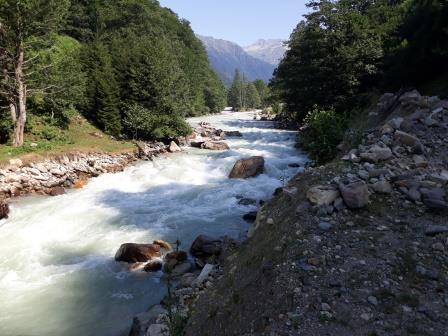NEWS

On July 5, 2018, after the sudden disaster that took place in the Chuberi Commune, the swelled river Nenskra flooded the villages of the Chuberi Commune, completely destroyed infrastructure, including bridges, roads and houses set along the river. Several villages of the Chuberi Commune have been cut off the outer world. The natural disaster occurred on the mudflat river Okrili, which is the right tributary of the Nenskra, running parallel to this, the natural disaster has been repeated in Mestia, in the Mestiachala-HPP project area where the mudflow washed the bridge away.
As known, it is planned to construct 35 hydroelectric power plants (HPP) in Zemo Svaneti, in the area of the river Enguri and its tributaries, along with several high-rise dams (Khudoni, Nenskra, Shari, Kaishi, etc.), which is actively protested by local people. They believe that such constructions in the region with high geological and seismic risks, along with the climate change, will further increase degradation of the Svans` residence place and environment. It is noteworthy that, construction of Nenskra-HPP, with the reservoir of 130 meters and 300 hectares is underway in the upper part of the river Nenskra, above the Chuberi Commune. The construction permit for the project was issued in October 2015. According to the project, it is planned to cut down and flood 400 hectares of intact forest.
A civil society and the local people have been expressing their concern over the construction of Nenskra-HPP since 2015. One of the main causes of their resistance is the givens that there are number of rivers flowing in the area of planned dam and reservoir, which are far more mudflow than the Okrili river, also, in the area mentioned, there are avalanche and landslide hotspots and their effects on Nenskra-HPP is not examined sufficiently. The geologic risks will further be strengthened as a result of the HPP`s project impact, since the forest/vegetation cover will be thoroughly cut down during the construction process, which will develop additional landslide and mudflow zones. The fact that, the natural disasters have been gradually aggravated as a result of global climate change is not assessed appropriately, whereas the microclimate altered by the HPP reservoir will aggravate this situation even more.
The company ,,Nenskra Hydro’’ issued the statement on the first day of the natural disaster (July 5) denying the connection between the HPP construction project and the natural disaster. According to the company, the natural disaster occurred 5 km away from the construction site. On July 6, 2018, the Prime Minister of Georgia Mamuka Bakhtadze related the natural disaster to the desultory forest cutting.
The above mentioned assertion of the company is wrong, because the river Okrili and its surrounding area are in the Nenskra project zone; this area had been the summer pasture of the Chuberi Commune prior the HPP project started. On the map, prepared by the International Online Platform for World Forests Monitoring ,,Global Forest Watch’’ , it is clear that in this section of the Nenska Valley there were practically no forest loggings in 2000-2007. Accordingly, the statement of the Prime Minister of Georgia, regarding the causes of the natural disaster, might also be inaccurate. Furthermore, the statement mentioned, is an attempt to shift the responsibility to the local population and individuals and to cover political criticism, which, by considering the economic and social reasons causing ecological challenges, is irresponsibility.
Apart from Zemo Svaneti, the construction of more than 100 HPPs is planned in other mountainous regions of Georgia (Zemo Adjara, Khevi, Racha, Kvemo Svaneti). None of these projects have been evaluated circumstantially in the context of geological and seismic risks and threats that their enhancement poses, as a result of global climate change.
Therefore, the Government of Georgia should examine and evaluate:
- The events that took place on the river Okrili and the real causes of the occurrence; and
- Geological and hydrological processes of the river Enguri, potential threats and the ways of their prevention.
Additionally, with the involvement of international financial institutions and other donors, the Government of Georgia should convene Netherlands Commission for Environmental Assessments [1], which
- Will expertise the Nenskra-HPP project documentation in the context of the newly-generated and expected natural disasters; and
-Will assess the cumulative effects of HPPs planned in the Enguri Basin and their connection with the geological processes in the region.
According to Zemoa Svaneti`s example, similar assessments should be made in other mountainous regions of Georgia where construction of HPPs is planned, including Racha, Khevi, Kvemo Svaneti, Zemo Adjara.
Apart from the above mentioned actions, the Government of Georgia, through the involvement of international financial institutions and other donors, should immediately initiate measures to assess the damage caused to the Chubei Commune as a result of the disaster and compensations issuance events in compliance with international standards. Until then, it is essential to the state to provide effective and well-timed humanitarian measures in communities affected by natural disaster.
Signing organizations:
Green Alternative;
Georgian Young Lawyers` Association (GYLA);
Human Rights Education and Monitoring Center (EMC);
Greens Movement of Georgia;
Energy Efficiency Foundation (EEF);
Association for Farmers Rights Defense (AFRD)
Center of Cultural Relations – Caucasian House.
[1] Note: Netherlands Commission for Environmental Assessment is an institution with high authority, its competence is recognized internationally and has many years of experience with the Government of Georgia http://www.eia.nl/en
SHARE: